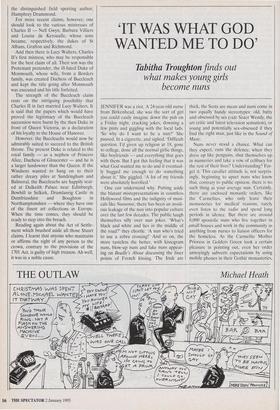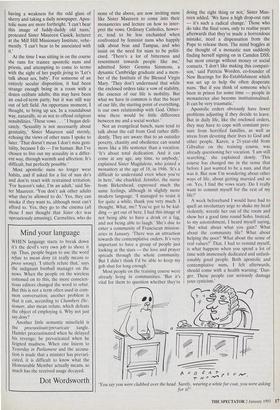'IT WAS WHAT GOD WANTED ME TO DO'
Tabitha Troughton finds out
what makes young girls become nuns
JENNIFER was a riot. A 24-year-old nurse from Birkenhead, she was the sort of girl you could easily imagine down the pub on a Friday night, cracking jokes, downing a few pints and giggling with the local lads. 'So why do I want to be a nun?' She paused, lit a cigarette, and sighed. 'Difficult question. I'd given up religion at 18, gone to college, done all the normal girlie things, like boyfriends — and everything that goes with them. But I got this feeling that it was what God wanted me to do and it eventual- ly bugged me enough to do something about it.' She giggled. 'A lot of my friends were absolutely horrified.'
One can understand why. Putting aside the blatant misrepresentations in countless Hollywood films and the indignity of musi- cals like Nunsense, there has been an insidi- ous leakage of the nun into popular culture over the last few decades. The public laugh themselves silly over nun jokes. 'What's black and white and lies in the middle of the road?' they chortle. 'A nun who's tried to use a zebra crossing!' And so on, the more tasteless the better, with kissogram nuns, blow-up nuns and fake nuns appear- ing on Beadle's About discussing the finer points of French kissing. The Irish are
thick, the Scots are mean and nuns come in two equally handy stereotypes: old, batty and obsessed by sex (vide Sister Wendy, the art critic and latest television sensation), or young and potentially sex-obsessed if they find the right man, just like in the Sound of Music.
Nuns never stood a chance. What can they expect, runs the defence, when they dress up like penguins, shut themselves up in nunneries and take a vow of celibacy for the rest of their lives? Understanding? For- get it. This cavalier attitude is, not surpris- ingly, beginning to upset nuns who know that, contrary to public opinion, there is no such thing as your average nun. Certainly, there are enclosed monastic orders, like the Carmelites, who only leave their monasteries for medical reasons, rarely even listen to the radio and spend long periods in silence. But there are around 8,000 apostolic nuns who live together in «small houses and work in the community as anything from nurses to liaison officers for the homeless. As the Carmelite Mother Prioress in Golders Green took a certain pleasure in pointing out, even her order annoyingly subverts expectations by using mobile phones in their Gothic monasteries, having a weakness for the odd glass of sherry and taking a daily newspaper. Apos- tolic nuns are more forthright. 'I can't bear this image of fuddy-duddy old nuns,' protested Sister Maureen Cusick, lecturer at the Mill Hill Missionary Institute, vehe- mently. `I can't bear to be associated with it.'
At the time I was sitting in on the course she runs for trainee apostolic nuns and priests, and attempting to come to terms with the sight of her pupils jiving to 'Let's talk about sex, baby'. For someone of an entirely secular disposition, it had been strange enough being in a room with a dozen celibate adults; this may have been an end-of-term party, but it was still way out of left field. An opportune moment, I thought, to bring up sex. In a roundabout way, naturally, so as not to offend religious sensibilities. `These vows ... ' I began deli- cately. `Sexuality is not necessarily about genitality,' Sister Maureen said sternly, echoing the views of other nuns I spoke to later. `That doesn't mean I don't miss geni- tality, because I do — I'm human. But I've chosen to live out my sexuality in a differ- ent way, through warmth and affection. It's difficult, but perfectly possible.'
Most apostolic nuns no longer wear habits, and if asked for a list of nun do's and don'ts react with restrained irritation. 'For heaven's sake, I'm an adult,' said Sis- ter Maureen. 'You don't ask other adults what they're allowed to do.' Yes, they can smoke if they want to, although most can't afford to. Yes, they go to the cinema (all those I met thought that Sister Act was uproariously amusing). Carmelites, who do
Mind your language
WHEN language starts to break down it's the devil's very own job to shore it up. Thus, people began to use the word refute to mean deny (it really means to prove wrong). 'I utterly refute that,' says the indignant football manager on the news. When the people on the wireless cottoned on to this, the more conscien- tious editors changed the word to rebut. But this is not a term often used in com- mon conversation; another problem is that it can, according to Chambers Dic- tionary, also mean refute, which defeats the object of employing it. Why not just say deny?
Another little semantic minefield is the procrastinate/prevaricate tangle. Hamlet procrastinated when he delayed his revenge; he prevaricated when he feigned madness. When one listens to Yesterday in Parliament and the accusa- tion is made that a minister has prevari- cated, it is difficult to know what the Honourable Member actually means, so much has the received usage decayed.
Dot Wordsworth
none of the above, are now inviting nuns like Sister Maureen to come into their monasteries and lecture on how to inter- pret the vows. Ordinary Catholics, howev- er, tend to be less enchanted when confronted by feminist nuns who happily talk about bras and Tampax, and who insist on the need for nuns to be politi- cised. `There's a lot of bitterness and resentment towards people like me,' admitted Sister Gemma Simmons, a dynamic Cambridge graduate and a mem- ber of the Institute of the Blessed Virgin Mary. 'They don't understand that while the enclosed orders take a vow of stability, the essence of our life is mobility. But what we have in common is that the heart of our life, the starting point of everything, is our own relationship with God. Other- wise there would be little difference between me and a social worker.'
Not an evangelical bunch, nuns tend to talk about the call from God rather diffi- dently. They are aware that to an outsider poverty, chastity and obedience can sound more like a life sentence than a vocation. 'It's about total dedication. And it can come at any age, any time, to anybody,' explained Sister Magdalene, who joined a monastery at the age of 18, in 1946. 'It's a difficult to understand even when you're in here,' she chuckled. Jennifer, the nurse from Birkenhead, expressed much the same feelings, although in slightly more modern language. 'I managed to resist it for quite a while, thank you very much. I thought, What, me? You've got to be kid- ding — get out of here. I had this image of not being able to have a drink or a fag, and not being able to laugh.' She's due to enter a community of Franciscan mission- aries in January. 'There was an attraction towards the contemplative orders. It's very important to have a group of people just looking at the stars — the love and prayer spreads through the whole community. But I didn't think I'd be able to keep my gob shut for long enough.'
Most people on the training course were already living in communities. 'But it's vital for them to question whether they're doing the right thing or not,' Sister Mau- reen added. `We have a high drop-out rate — it's such a radical change.' Those who do take the final vows, only to realise years afterwards that they've made a horrendous mistake, need a dispensation from the Pope to release them. The mind boggles at the thought of a monastic nun suddenly finding herself signing on in Camden DSS; but most emerge without money or social contacts. 'I don't like making this compari- son,' said Patricia Worden, co-founder of New Bearings for Re-Establishment which was set up to help the often desperate nuns. 'But if you think of someone who's been in prison for some time — people in monasteries also become institutionalised. It can be very traumatic.'
Apostolic orders obviously have fewer problems adjusting if they decide to leave. But in daily life, like the enclosed orders, they may have to cope with constant pres- sure from horrified families, as well as stress from devoting their lives to God and other people. Karen, a 21-year-old from Gibraltar on the training course, was already questioning her vocation. `I am still searching,' she explained slowly. 'This course has changed me in the sense that before I just wanted to be a nun, and that was it. But now I'm wondering about other ways of life, about getting married and so on. Yes, I find the vows scary. Do I really want to commit myself for the rest of my life'?'
A week beforehand I would have had to quell an involuntary urge to shake my head violently, wrestle her out of the room and show her a good time round Soho. Instead, to my astonishment, I heard myself saying, 'But what about what you gain? What about the community life? What about helping the poor? What about the sense of real values?' That, I had to remind myself, is what happens when you spend a lot of time with immensely dedicated and unfash- ionably good people. Both apostolic and contemplative nuns, I felt afterwards, should come with a health warning: 'Dan- ger. These people can seriously damage your cynicism.'
'You say you were clubbed over the head. Surely, wearing a white fur coat, you were asking for it?'











































 Previous page
Previous page